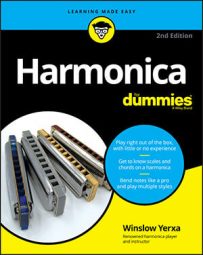Choosing tunes for the harmonica can lead you to some that are already known and played on the harmonica or it can lead you to tunes that are completely innocent of any association with the mouth harp. But before you begin selecting your tunes, consider these guidelines:
Pick tunes you feel good about. Maybe these tunes inspire you, maybe they mean something special to you, or maybe they just sound good to you.
Choose tunes within your reach. Maybe you can already play them or maybe you feel that you can get the hang of them quickly — a challenge is always good. Some tunes are way tougher than they seem, but others are surprisingly easy. The important thing is to pick a tune and attempt it — you’ll never know what you can do until you try.
Select tunes you can share, such as:
Tunes that use the instruments that your friends play
Tunes that your friends would like to play
Tunes that fall within everyone’s playing ability
Tunes that your listening friends would like to hear
Tried-and-true harmonica tunes
Some well-known tunes feature harmonica either as the lead instrument or as a prominent accompaniment. This existing harmonica repertoire is worth exploring. The tunes work, audiences know them, and you’ll really advance your playing by learning them.
A few of the best known include
Bob Dylan’s “Mr. Tambourine Man”
The country favorite “Orange Blossom Special,” featuring Charlie McCoy
The rocking “Whammer Jammer” from the J. Geils Band, featuring Magic Dick
Blues Traveler’s “Runaround,” featuring John Popper
“Low Rider” by War, featuring Lee Oskar
If blues is more your style, you can choose from hundreds of harmonica tunes, including these favorites:
Little Walter’s “Juke” and “Blues with a Feeling”
Sonny Boy Williamson II’s “Bye Bye Bird” and “Help Me”
Jimmy Reed’s “Honest I Do” and “Bright Lights, Big City”
Traditionally, harmonica players have learned repertoire (especially blues) by ear, but do check the Internet for tab sites (just be aware that much of what’s out there is created by amateurs and can vary in accuracy). If you can read music, the world is your oyster, but also check local stores or online sellers like Amazon.com for songbooks that include harmonica tab.
Many of these tunes will seem impossibly difficult, but they give you goals to aspire to. With practice, you’ll be able to attempt the tune you want to play, and that day may come sooner than you think.
Tunes that you can adapt to the harmonica
Never be afraid to try a new style of music or a particular tune just because you’ve never heard it done with a harmonica. The harmonica is a surprisingly flexible instrument, and you can improve your skills by trying new things.
How do you go about adapting new tunes to the harmonica? Here’s the obvious answer: You can simply try playing them. After you try them, here are some things to think about:
Does the tune sound good on harmonica? If not, why bother?
Do all the notes play easily on the harmonica, stay in tune, and sound with good tone? Bent notes can sound squawky and out of tune if you’re not careful. Notes that seem awkward to reach or don’t sound good may reveal areas where you can improve your playing technique.
Will the tune surprise an audience? Surprise can quickly turn to delight, and you can have fun playing against type by presenting a tune that the audience would never expect to hear from a harmonica.
Will the rendition interest an audience of folks who don’t play harmonica? Sometimes harmonica players get wrapped up in their own world and need a little perspective. After all, what’s amazing to harmonica players for technical reasons may seem ho-hum to an audience that doesn’t share an insider’s perspective.
If you can answer all these questions in the affirmative, you’re in good shape for making a fresh addition to your repertoire.

